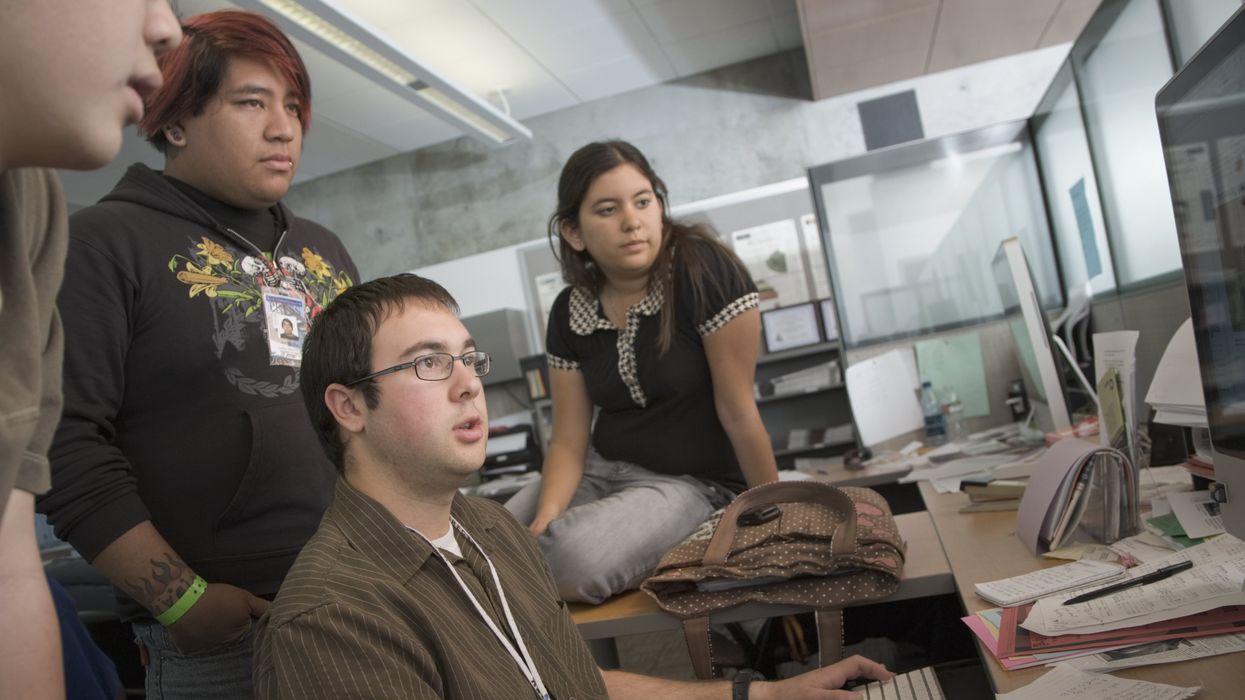Alice Li is a student at Indian Mountain School in Lakeville, Conn.
Last year was a big one for student journalists. A reporter for Stanford University’s newspaper, The Stanford Daily, revealed that the university’s president fudged some numbers in his qualitative neuroscience research. The president, Marc Tessier-Lavigne, resigned in face of the allegations.
Before that, reporters at The Daily Northwestern at Northwestern University revealed racist hazing events under the football coach Pat Fitzgerald. The coach was fired and an assistant athletic director resigned – impressive impact from a few stories.
But for 2024 to be even bigger for student journalists, Congress needs to step in and pass a national “New Voices” law.
New Voices laws are statutes that protect student journalists from having their stories censored unless they’re libelous, an invasion of privacy or constitute a “clear and present danger” or a “material and substantial [school] disruption. ”
Only sixteen states and the District of Columbia have passed laws that explicitly provide protections for student journalists. That means school administrators in 34 states can spike any story they want, whenever they want.
In certain states without these protections, administrators have taken action. They closed down an entire newspaper program at Northwest High School in Grand Isle, Neb.,, after the paper published two opinion columns about LGBTQ issues. The year before, at Westside High School in Omaha, administrators censored an editorial about censorship.
At first blush, these reports seem like blatant First Amendment violations but they’re not.
Administrators are permitted to suspend student newspaper advisors and shutter publications because 35 years ago, in Hazelwood School District v. Kuhlmeyer, the Supreme Court overturned a decision that gave full First Amendment protection to student journalists. In 1988, the court held that schools can censor student newspapers because they are closed, non-public forums and the censorship might be related to a legitimate pedagogical goal. (In 2005, an appellate court held that the Hazelwood holding applies to college newspapers as well.)
The Supreme Court said the school was not a public forum like streets or parks that “have been used for purposes of assembly, communicating thoughts between citizens, and discussing public questions." The five justices who wrote the decision said the school would be a public forum if school authorities have "by policy or by practice" opened those facilities "for indiscriminate use by the general public."
The decision itself notes that 4,500 copies of the newspaper were distributed in the year in question. Indiscriminate use by the general public was almost impossible to achieve with such low circulation of print media.
But school journalism is different now, 35 years later. The general often relies on articles from student journalists. The Harvard Crimson has significant traffic to its website, with 303,797 visits in the 2021-22 academic year. A student at Brown University has an average of 1,792 shares per article she’s published. College newspapers have made a better transition to the digital landscape than even mainstream local news outlets, mostly because current students are digital natives and they are highly engaged with the happenings in their college communities.
High school newspapers haven’t fared as well in terms of digital transition; 64 percent of public high schools have a newspaper; which amounts to 11,000 school news organizations. Only about one-third of them have an online component. That’s low, perhaps too low, in 2024 with so much media online. But if the online stories are relied on by the public, they deserve protection.
It must be Congress that fixes this as protection isn’t likely to come from the Supreme Court any time soon. Even though the court seems anxious to overturn precedent lately, the Hazelwood holding probably isn’t one that will be reversed. It would be hard to convince a majority of the justices that a high school newspaper is a public forum since they haven’t extended that status to other arenas.
Congress has an interest in this; a number of bills and resolutions have been introduced in the past few years seeking to protect local news outlets. None have passed. The fact is that these student newspapers are covering for the local news outlets that lack the resources to conduct investigations.Censoring school journalists is consequential for local communities. Reporters for these school publications have done groundbreaking investigations that serve the public, not just the school community.
To be clear, good journalism has happened in states without the protections of New Voices laws. For example, Cedar BluePrints, the news magazine of Cedar Shoals High School in Georgia, uncovered a campaign finance scandal when it looked into the background of a new school board member who had misrepresented having graduated from that school. A high school in Kentucky found that the state police force was training cadets with a slideshow that quoted Hitler three times and essentially instructed them to use excessive force. Gov. Andy Beshear (D) took note and promised action.
And state-based New Voices laws alone aren’t a failsafe. California has one of the strongest New Voices laws, yet the Los Angeles Unified School District ignored the law and suspended a teacher at Daniel Pearl High School — a journalism magnet school named for the Wall Street Journal reporter who was kidnapped and killed in 2002 — for refusing to censor a school newspaper story that contained the name of a librarian who chose to quit rather than get the Covid-19 vaccine, leaving students without library access.
Enacting a nationwide New Voices law would strengthen state versions and provide unprecedented protection in states that don't have one on the books. The current patchwork leaves some student journalists open to censorship while others are free to do their best work. Congress should do what it can to allow all student journalists’ stories to emerge.





















Trump & Hegseth gave Mark Kelly a huge 2028 gift